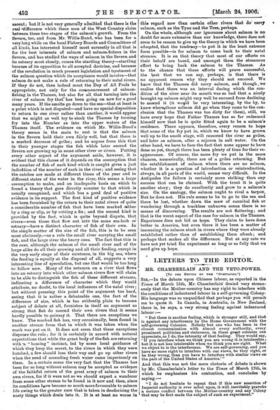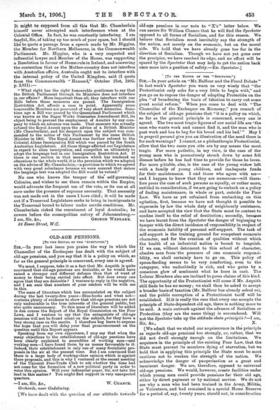LETTERS TO THE• EDITOR.
MR. CHAMBERLAIN AND THE VETO-POWER. [To THE EDITOR OF THE "SP Ear...Toll:1 SIR,—In the debate upon Chinese labour, as reported in the Times of March 15th, Mr. Chamberlain denied very strenu- ously that the Mother-country has any right to interfere with the conditions of indentured labour in a self-governing Colony- His language was so unqualified that perhaps you will permit me to quote it. In Canada, in Australia, in New Zealand, there is, he says, a very strong feeling against indentured
labour :—
"But there is another feeling, which is stronger still, and that is against any interference by the Home Government with the self-governing Colonies. Nobody but one who has been in the closest communication with almost every authority, every prominent politician and statesman, in these great colonies can appreciate, as I do, the intensity of that feeling. They would say, ' If you interfere when we think you are wrong it is intolerable ; but it is not less intolerable when we think you are right. What we object to is the interference. We are self-governing, and you have no more right to interfere with our views, be they right, or be they wrong, than you have to interfere with similar views on• the part of the United States of America.'"
And that this was not the mere rhetoric of debate is shown by Mr. Chamberlain's letter to the Times of March 17th, which he emphasises his contention, and concludes by saying :- " I do not hesitate to repeat that if this new assertion of Imperial authority is ever acted upon, it will, inevitably provoke a serious conflict between the Mother-country and any Colony that may be first made the subject of such an experiment." - It might be supposed from all this that Mr. -Chamberlain himself never attempted such interference when at the
Colonial Office. In fact, be was constantly interfering. I am fearul,.Sir, of taking up too much of your space, but I should,
44 to quoted passage from a speech made by Mr. Higgins, the Member for Northern Melbourne, in the Commonwealth
Parliament. Mr. Higgins, who is a very respected and influential lawyer and Member of the House, was supporting a Resolution in favour of Home-rule in Ireland, and answering the contention that as the Mother-country does not interfere with Australian affairs, Australia ought not to. interfere with the internal policy of the United Kingdom, said (I quote from the Commonwealth " Hansard," October 21st, 1905,
p. 3,811) :— "What right has the right honourable gentleman to say that the British Parliament through its Ministers does not interfere in our affairs ? , More important than all, they interfere with our Bills before those measures are passed. The Immigration Restriction Act affords a case in point. Apparently some honourable Members are possessed of very short memories. Some time ago a Bill was passed by the Queensland Parliament which was known as the Sugar Works Guarantee Amendment Bill, its object being to prevent the employment of Asiatics by any com- pany to which an advance was made. That measure was actually refused the Royal Assent upon the advice of a British Minister (Mr. Chamberlain), and his despatch upon the subject was com- mended to the notice of this Parliament by the same British Minister in 1901. The Royal Assent was further refused to the Colonial Aliens Immigration Bill which was passed by the South Australian Legislature. All these things affected our Legislature in regard to alien immigration, and compelled us ultimately to adopt the language test in our Immigration Restriction Act. If there is one section in that measure which has rendered us obnoxious to the whole world, it is the provision which we adopted on the advice of Mr. Chamberlain,—a provision to which we agreed with very groat reluctance because we were assured that unless the language test was adopted the Bill would be vetoed."
No one who knows the temper of the° • self-governing Colonies, and wishes to see them remain within the Empire, would advocate the frequent use of the veto, or its use at all
save under the pressure of supreme necessity. That necessity was not made out in the cases I have cited ; it will be made out if a Transvaal Legislature .seeks to bring in immigrants to the Transvaal bound to labour under servile conditions. Mr. Chamberlain risked the resentment of loyal Australia; he cowers before the cosmopolitan outcry of Johannesburg.—











































 Previous page
Previous page